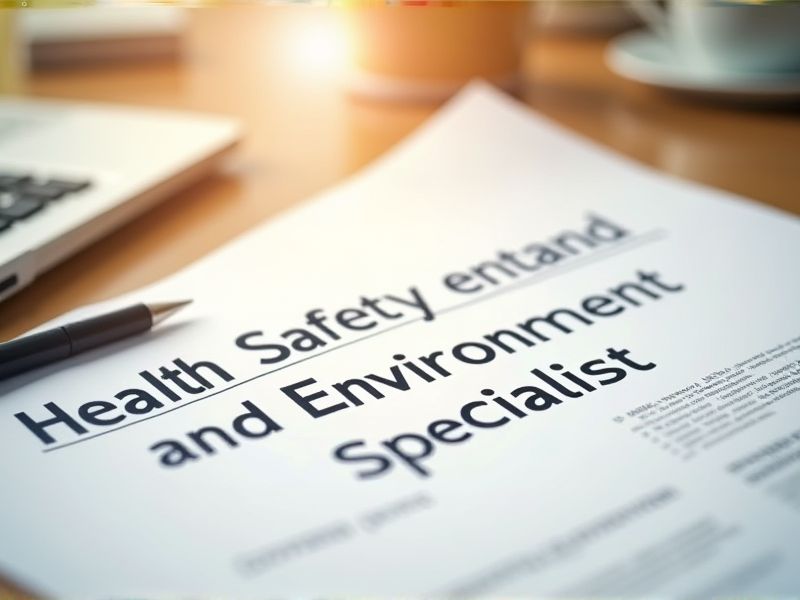
Health, Safety, and Environment (HSE) Specialists play a crucial role in maintaining workplace safety and minimizing environmental impacts. Certification is crucial as it equips them with the necessary expertise and ensures compliance with industry standards. As regulations evolve, certifications keep specialists updated on the latest safety practices and risk management strategies. Key certifications for Health Safety and Environment Specialists include NEBOSH, OSHA, and ISO 45001.
NEBOSH International General Certificate in Occupational Health and Safety
The NEBOSH International General Certificate provides comprehensive knowledge of occupational health and safety, crucial for a Health, Safety, and Environment Specialist to identify and mitigate workplace hazards. It ensures that the specialist understands international best practices and legal standards, facilitating compliance across various organizational settings. This credential enhances the professional's ability to implement effective safety management systems, which reduces workplace incidents and associated costs. Gaining the NEBOSH certification boosts the specialist's credibility and career prospects within the field, given its global recognition.
OSHA 30-Hour General Industry Certification
Receiving an OSHA 30-Hour General Industry Certification equips Health Safety and Environment (HSE) Specialists with a comprehensive understanding of OSHA regulations, ensuring they can effectively identify and mitigate workplace hazards. The certification enhances the specialist's ability to develop and implement safety protocols, reducing the likelihood of workplace injuries. Having this certification signifies a commitment to maintaining high safety standards, which can improve workplace morale and productivity. Employers may prioritize candidates with this certification, as it demonstrates a proactive approach to health and safety management.
Certified Safety Professional (CSP)
Achieving Certified Safety Professional (CSP) status enhances an HSE specialist's credibility, indicating a high level of expertise and commitment to safety standards. Employers perceive CSP-certified individuals as more knowledgeable, which often leads to increased job opportunities and potential career advancement. The rigorous CSP certification process ensures that specialists are up-to-date with the latest industry regulations and safety practices, effectively reducing workplace hazards. A certified specialist is better equipped to implement comprehensive safety strategies, contributing to a safer work environment and reducing the incidence of accidents and injuries.
Certified Industrial Hygienist (CIH)
Certified Industrial Hygienists (CIHs) provide a structured and scientific approach to managing workplace hazards, which directly enhances the effectiveness of a Health Safety and Environment (HSE) Specialist. Their expertise in identifying, evaluating, and controlling environmental stressors contributes to maintaining health standards and reducing occupational risks. HSE Specialists benefit from a CIH's ability to interpret complex data and implement evidence-based interventions, improving overall safety outcomes. Their certification signifies a high level of competence, instilling confidence in compliance with regulatory requirements and industry best practices.
ISO 45001 Lead Auditor Certification
ISO 45001 Lead Auditor Certification provides Health Safety and Environment Specialists with an in-depth understanding of international safety management system standards, which drives improvements in workplace safety practices. The certification equips professionals with the skills to identify risks, leading to the reduction of workplace incidents and injuries. It also enhances the credibility of specialists, increasing organizational trust and compliance with regulatory requirements. Having this certification can lead to improved career opportunities, as it is often considered essential for leadership roles in health and safety management.
ISO 14001 Environmental Management Lead Auditor Certification
ISO 14001 Environmental Management Lead Auditor Certification equips Health Safety and Environment Specialists with the skills to assess and enhance environmental management systems. Certification enhances professionals' credibility, increasing trust with stakeholders concerned about environmental impact. It enables specialists to identify non-compliance and continuous improvement opportunities, thereby mitigating environmental risks. This credential aligns specialists with global standards, supporting organizations in maintaining sustainable practices and regulatory compliance.
First Aid, CPR & AED Certification
Certification in First Aid, CPR, and AED is essential for Health Safety and Environment Specialists because it equips them with the skills to respond effectively to emergencies that can occur in the workplace. Possessing these certifications enhances the specialist's ability to provide immediate care, potentially saving lives and reducing the severity of injuries before professional medical help arrives. This training ensures compliance with occupational health regulations, minimizing legal risks for organizations. Certified specialists also contribute to creating a safer work environment by fostering a culture of preparedness and responsiveness among employees.
Certified Environmental, Safety and Health Trainer (CET)
A Certified Environmental, Safety and Health Trainer (CET) equips Health Safety and Environment Specialists with essential instructional skills, enhancing their ability to effectively communicate safety protocols. With comprehensive training, these specialists can better ensure compliance with safety regulations, reducing workplace hazards. The CET credential also verifies their expertise, increasing trust among stakeholders and employees. By having a CET certification, HSE specialists can significantly improve their problem-solving capabilities in dynamic environments.
Construction Health and Safety Technician (CHST)
Construction sites present numerous safety hazards and complex regulatory requirements, necessitating a Construction Health and Safety Technician to ensure compliance. Health Safety and Environment Specialists rely on CHSTs for their specialized knowledge in mitigating risks specific to the construction industry. The involvement of a CHST enhances safety protocols, reducing accident rates and potential legal liabilities. A CHST provides vital training and assessments that contribute to creating a safer work environment for all construction personnel.
Associate Safety Professional (ASP)
An Associate Safety Professional (ASP) certification equips Health Safety and Environment Specialists with essential knowledge to recognize and mitigate workplace hazards. This credential demonstrates a commitment to maintaining industry standards, reducing risks of accidents and injuries. Having an ASP can elevate an organization's safety reputation, leading to increased trust from employees and stakeholders. Companies benefit from certified professionals, as they contribute to regulatory compliance and can decrease potential legal liabilities.
Summary
By obtaining certifications, you enhance your credibility and expand your expertise as a Health Safety and Environment Specialist. This leads to more effective risk management and improved workplace safety protocols. Your certified status can also result in better career opportunities and potentially higher salaries. Employers may view you as an asset, fostering trust and reliance in your professional capabilities.
